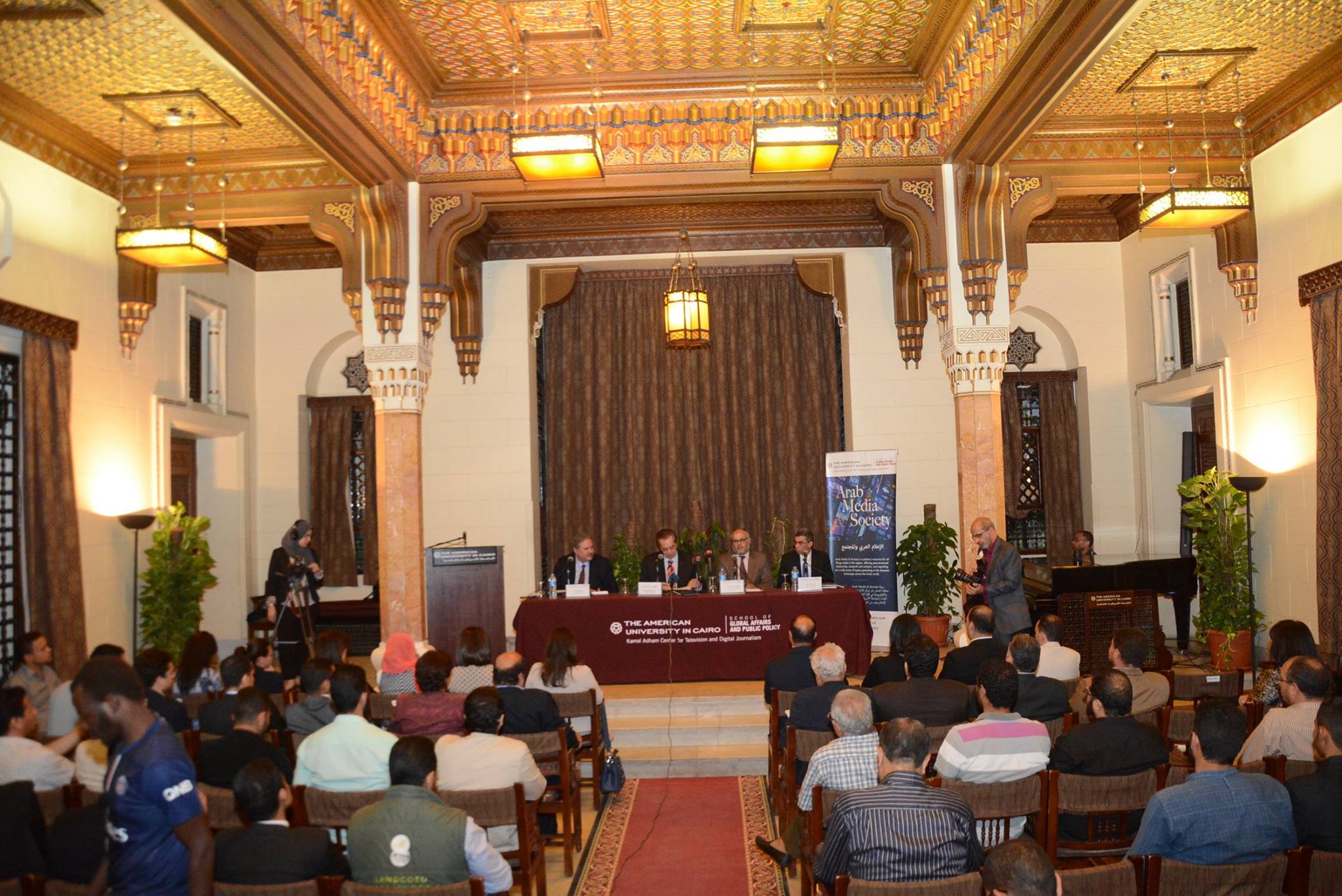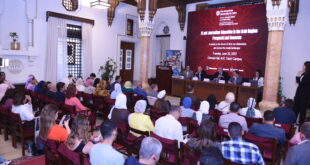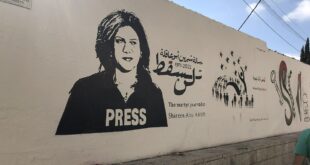Issue 24, summer/fall 2017
https://doi.org/10.70090/BA17RMPA
The Kamal Adham Center for Television and Digital Journalism in the School of Global Affairs and Public Policy at the American University in Cairo (AUC) hosted a symposium on “Media and Politics” on Wednesday, May 24, 2017. The symposium, which brought together professors specialized in multiple scholarly disciplines, senior journalists, diplomats, and legal experts was organized by the Research and Publications Division of the center. International students from several countries, including Indonesia, South Africa, Malaysia, India, Chad, and Thailand, attended the event, which was extensively covered by Egyptian private and state-owned media outlets.
The symposium included discussions of several topics related to the current political landscape in the Middle East and the role of media, shedding light on recent political developments at both the local and global levels. Specifically, three themes were addressed: Media and religious extremism, media and regional security, and Egyptian media and foreign policy.
The event coincided with a massive wave of terrorism that has hit many parts of the world. Contemporary terrorist groups use social media and the Internet extensively to recruit new members, show their capabilities and send targeted messages to as many people as possible across the globe. Therefore, developing media strategies to combat terrorism is particularly critical at this historical juncture.
The Unprecedented Effect of Media on Politics
The symposium was moderated by Counselor Adly Hussein, former governor of Al Qalyubiyah. Hussein emphasized the impact that media and politics have on one another. While political actors can influence the agendas and orientations of media institutions, media is playing an unprecedented political role amid internal developments in Egypt, a complicated Mideastern political scene, and intense international conflicts.
This situation, pointed out Hussein, puts the future of Arab societies in question amid “a reality that is full of challenges,” adding that Arabs want to know the truth and want access to accurate information. Linking his arguments to issues of terrorism and religious violence, Hussein emphasized that these phenomena should be countered through the development of a politico-religious discourse that is based on prudence and rationality. However, he did not specify which institutions should be responsible for handling this process of reform.
Hussein said he was previously involved as a judge in 35 cases filed against journalists in Egyptian criminal court. He argued that journalists mainly seek to reveal secrets, which explains the state of continuous clash between political authorities and media outlets. The situation becomes even more problematic, stressed the ex-governor, when the secrets revealed by journalists are related to national security.
Hussein also argued that a change in the definition of national security has taken place. As an example, Hussein brought attention to a common sign visible next to a variety of facilities in Egypt, such as bridges and military units, which reads “Don’t Approach, Photography Prohibited.” He pointed out that keeping these signs in place is no longer logical, as satellites are constantly taking images despite stated restrictions.
Hussein said that, when he was a governor, he ordered his team to depend on pictures provided by Google Maps to spot illegal construction in Al Qalyubiyah. He also referred to rankings of the strongest militaries around the world, showing that they are developed on basis of information that is regularly provided by news outlets about the weapons and capabilities of each army. Hussein used this example to argue that some military information can be easily accessed and is no longer considered secret, as governments regularly reveal their military agreements and arms deals.
The Role of Media in Combating Religious Extremism
Ibrahim El Hodhod, former president of Al-Azhar University, tackled the relationship between Islamic extremism and media. He described media as the most effective “weapon” used by states to achieve their objectives. For example, he said that the United States spent $2 billion on a media campaign to defend its invasion of Iraq, while Israel is continuously spending hundreds of millions of dollars to justify its actions through the media.
El Hodhod traced religious extremism back to the days of Prophet Mohammed. Some people—adopting extremist views—objected to some of Mohammed’s actions. El Hodhod spoke of a hadith (saying of Prophet Mohammed), which showed that an extremist accused Mohammed of not treating all people as equals.
A religious extremist, stated El Hodhod, refuses to engage in dialogue with others, even the Prophet Mohammed himself. As discussion is not an option, Mohammed believed that states should fight against extremists to prevent them from gaining strength.
El Hodhod argued that, in the 21st century, media should play a role in fighting religious extremism. Shifting focus to contemporary Islamist extremist groups such as ISIS, El Hodhod said that these armed movements were the most successful in terms of using social media. He cited European Union estimates that ISIS has 5,800 websites operating within Europe, while English and Arabic news websites—launched in the Arab world—number at around 4,000.
ISIS, according to El Hodhod, managed to recruit male and female youth—especially those between 16 and 25 years old—by developing a discourse that is appealing to them. El Hodhod, meanwhile, highlighted the failure of Western media to differentiate between the extremist Islamic schools of thought—adopted by ISIS and groups of a similar nature—and Islam itself, thus equating Muslims with terrorism.
For him, these challenges should be taken on by media institutions in the Arab world. El Hodhod accused Arab news outlets of both hosting people who lack sufficient expertise to debate issues of Islamic extremism, and not providing in-depth analysis of the causes, motives, and ideas of ISIS and the best possible means of combatting them.
He called on media outlets to play their role in shaping awareness of youth about Islam, especially when ISIS is claiming that Egypt has a society of infidels. El Hodhod underlined that ISIS employs only about 5 percent of the Islamic Sharia by focusing only on hudud (Islamic criminal punishment) and accusing Arab rulers of violating religious laws by not implementing them. Therefore, Arab media should host Islamic scholars and experts on the topic to provide the public with logical responses to these claims. This is the only way to spread a culture of religious tolerance and moderation.
Media as a Tool of Foreign Policy
Discussing the relationship between media and foreign policy, Yasser Rizk—chairman and editor-in-chief of Akhbar Al Youm Establishment—defined the latter as a set of beliefs, objectives, and measures through which a country’s national security objectives are determined and defended. Rizk underlined four tools that are generally used for achieving foreign policy objectives. The first one involves bilateral or multilateral diplomatic relations, which can be developed through international institutions such as—in the case of Egypt—the Arab League, the African Union, and the United Nations. States can also depend on economic measures by either providing aid and foreign direct investment or imposing economic pressures and sanctions against individuals and other states. When the above-mentioned tools prove to be ineffective, states can resort to the use of force.
For Rizk, after the Second World War, media became a new foreign policy tool. He said that the effectiveness of media in influencing foreign policy was particularly evident during and after the First Gulf War, when people began watching live coverage of combat. On these bases, Rizk argued that true neutrality is an impossibility for media institutions. However, the extent of professionalism may differ among news outlets.
Rizk mentioned that the media can also be a source of entertainment, highlighting that Egypt “won the hearts” of the Arab world through its cultural endeavors, particularly literature and film. Another example he referred to was The Voice of the Arabs radio station, which promoted the ideas of pan-Arabism among Arab societies during the Nasserite era. Rizk discussed other Arab experiences of creating and buying media institutions, such as those of Saudi Arabia and Qatar, who have founded outlets to serve foreign policy goals as well.
He emphasized that Egyptian foreign policy is negatively affected by challenges—whether related to planning, financial support, or administrative competency—that both public and private media institutions in the country are currently suffering from. For instance, Rizk said that most news outlets in Egypt do not sufficiently cover international events, while many of them cannot be accessed outside the country.
Rizk discussed the meetings of Egypt’s President Abdel Fattah El-Sisi with then US presidential candidates Donald Trump and Hillary Clinton on the sidelines of last year’s UN General Assembly meetings in New York. He showed that each candidate used the media to deliver messages that serve the objectives of their respective campaigns. According to Rizk, Clinton claimed that she mainly discussed human rights in Egypt during her meeting with Sisi. However, Rizk said that—according to well-informed sources he interviewed—this subject took only five minutes out of an hour-long conversation. In the meantime, Rizk praised Trump for frankly reporting to the media the topics that he tackled with the Egyptian president. Rizk, however, did not specify the topics that Sisi and Trump had discussed.
Media and Arab National Security
Hussein Amin, professor of journalism and director of the Adham Center, focused on press freedoms and their impact on national security in the Arab world. Amin stated that debate around media freedoms and the requirements of national security is a major challenge for many countries, particularly in the Middle East. Amin said that states should not think of security only in terms of maintaining internal stability and protecting citizens from external threats. Instead, they should consider the impact of modern changes in communications technology on their ability to keep information related to national security classified.
In the age of terrorism, this debate has grown due to an unprecedented increase in the capacity of communications technology, enabling individuals and communities to communicate directly with others both locally and internationally. The emergence of the so-called citizen journalist—challenging the traditional media norms and customs—raises questions about whether this level of press freedoms has negative implications on national security.
Amin highlighted the impact of the global recession and poverty on fostering instability, especially in Arab societies. In addition, in the Arab world, the emergence of extremist groups and others with terrorist ambitions have further limited freedom of expression, as the dissemination of false information and false news pose additional risks to security and stability. Amin said that despite the exponential growth of social media over the past few years—the so-called “mainstream media” continues to control the news narrative.
However, Amin emphasized the need for regulating the activities of media through adopting new legal arrangements in the Arab world. Although previous Arab endeavors did not lead to fruitful results, laws can counter the security threats posed by terrorist groups, civil wars, and conflicts that exist in this part of the world. Laws, therefore, should be developed to ensure that no media coverage would increase the challenges faced by state institutions in terms of maintaining domestic order and internal stability.
Amin gave examples of international agreements and treaties, which stipulate that news outlets have “duties and responsibilities” by which they must abide so they may enjoy freedom in conducting their activities. He referred to laws adopted in the United States, the European Union (EU), Germany, Russia, India, China, Pakistan, Jamaica, Mexico, and Brazil that permit the process of imposing restrictions on media activities for security reasons. Amin concluded that media freedoms are not absolute and they are subject to some restrictions in times of war, conflict, and crises.
Whether working under the umbrella of a democratic or authoritarian political environment, the media must be completely committed to accuracy, credibility, and the rule of law in times of conflict. Hence, Amin believes that, especially if the state is facing terrorist attacks, it should ensure that media outlets are working in accordance with such guidelines.
Conclusions
There was a consensus among the panelists about the impact of media institutions on the socio-political conditions and religious beliefs within Arab societies. Giving more airtime, for example, to scholars of Islamic studies could engage citizens in religious discourse that challenges the shallow, radical understanding of religious texts by groups like ISIS. This can explain the rationale of governments around the world in terms of either investing in already-existing media institutions or establishing new ones to serve their foreign policy goals. For example, if governments are seeking to reduce the popular tendency towards accepting hate speech—which might represent a threat to socio-political coexistence among their societies—a media campaign can help them achieve this objective.
As a result, it is possible to argue that not recognizing the significant role of media can lead a state to be an ineffective regional and international actor. Nevertheless, due to the global spread of terrorism, national media councils, news outlets, and broadcasting syndicates should create new legal codes of conduct and guiding manuals to establish a clear line between press freedom and national security; even the world’s most democratic states have such laws. Judges involved in cases filed against media institutions or individuals should be completely aware of the dynamics of the tripartite relationship—as well as its continuous evolution—between politics, media, and security. In addition to the importance of introducing—both internally and externally—models of Arab public and cultural diplomacy, additional support should be given to media research. The reason entails studying the discourse and performance of media outlets during conflicts, which are currently taking place on a large scale and covered by news organizations on a daily basis.
 Arab Media & Society The Arab Media Hub
Arab Media & Society The Arab Media Hub





